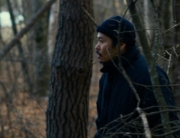

It might be a coming-of-age story, but House of Hummingbird rises above conventional narrative beats often imposed on this genre to feel truly raw and unique. More melancholic than whimsical, the film follows 14-year old Eun-hee (Ji-hu Park) living in 1994 Seoul as she navigates the trials and betrayals of adolescence and a complicated home. It’s a story told through solemn gestures and telling wide shots, with a strong emotional payoff in the face of a devastating national tragedy.
Inspired by events from director Kim Bora’s childhood, the film provides an upfront look at a dysfunctional middle-class household and Eun-hee’s place within it. Her mom (Seung-yeon Lee) works late hours in their family’s rice cake shop co-owned by her father (In-gi Jung), who, it’s implied, is having an affair. When the two argue with each other back home, things get verbally heated and even bloody. Her siblings don’t offer much comfort either. Sister Soo-hee’s (Soo-yeon Park) grades aren’t amounting to much and brother Dae-hoon (Sang-yeon Son), whom the parents have banked most of their academic hopes on, hits his sisters regularly. This leaves Eun-hee an outlier in everyone’s interloping conflicts, acknowledged but rarely shown love or affection.
With little enduring warmth back home, Eun-hee attempts to form friendships at school or through delinquent activities. These lead to standard teenage interests, including kissing her first boyfriend, making friends at a dance club, and attempted shoplifting. Yet her most durable friendship is not with a student but the new Chinese-language tutor, Young-ji (Sae-byuk Kim), who asks her students what interests them rather than rigidly telling them what to do.
Whether it’s discussing the difference between people you know versus those who understand you, or acknowledging how having enough money for university tuition won’t solve life’s problems, Young-ji is a rebel in an establishment position that otherwise enforces strict guidelines. This allows the teacher to reach Eun-hee emotionally in a way few others achieve and encourage her to reject the daily abuses of her school and family as inevitable.
This is a story deliberately full of inconclusive answers, yet it regularly links the plot’s domestic struggles to a larger nationalist picture of the era. Eun-hee’s family struggles to rise above their economic profiles, so they vent their aggression toward one another. Even the adolescent experiences lead to heartbreak rather than Hollywood quirkiness, as potential friends and boyfriend material alike leave our protagonist for ultimately selfish reasons. This personal story eventually merges into the 1994 collapse of the Seongsu Bridge’s aftermath, which shocked South Korea into recognizing its socioeconomic fault lines.
As Bora’s feature-length debut, House of Hummingbird excels at visual storytelling. Key reaction scenes are always shot within a wide frame, emphasizing the empty space as a mirror for Eun-hee’s loneliness. It doesn’t matter if the location is her family’s apartment (in a drab tower block), a park, or a crowded schoolroom—everything seems detached, no matter how crowded it looks. These scenes are complimented by Park’s performance, conveying both sensitivity and quiet outrage as she navigates one youthful complication after another in search of lasting companionship.
Coming-of-age movies regularly push its young characters to recognize their foibles in defiance of the adult world’s failure to solve everyday problems. Yet Hummingbird implies that the system obstructs not only the protagonist’s happiness but that of everyone else. Early on, Eun-hee’s mom asks her why she can’t “just apologize and be a good student” for her homeroom teacher, fearing that she’ll become a dropout, yet that very school system discourages non-educational activities enjoyed by her daughter’s generation. Spending time with Young-ji, despite its simplicity, allows Eun-hee to be free and open. Her personal growth is never made out as something that can upend the system, but it can help her survive its misfortunes. If there’s any takeaway from this film, it’s that Eun-hee can’t help but rebel.
In wake of Parasite’s Oscar-winning success, it’s hopeful that we’ll see a rising interest in Korean cinema. House of Hummingbird is a great place for moviegoers to start. It offers a conflict on dual fronts: a teenage girl’s self-discovery and a country developing too fast to realize it until tragedy strikes. In both cases, Kim Bora succeeds at telling a story worth recommending, even to those who fear the barrier of subtitles.






Leave A Comment